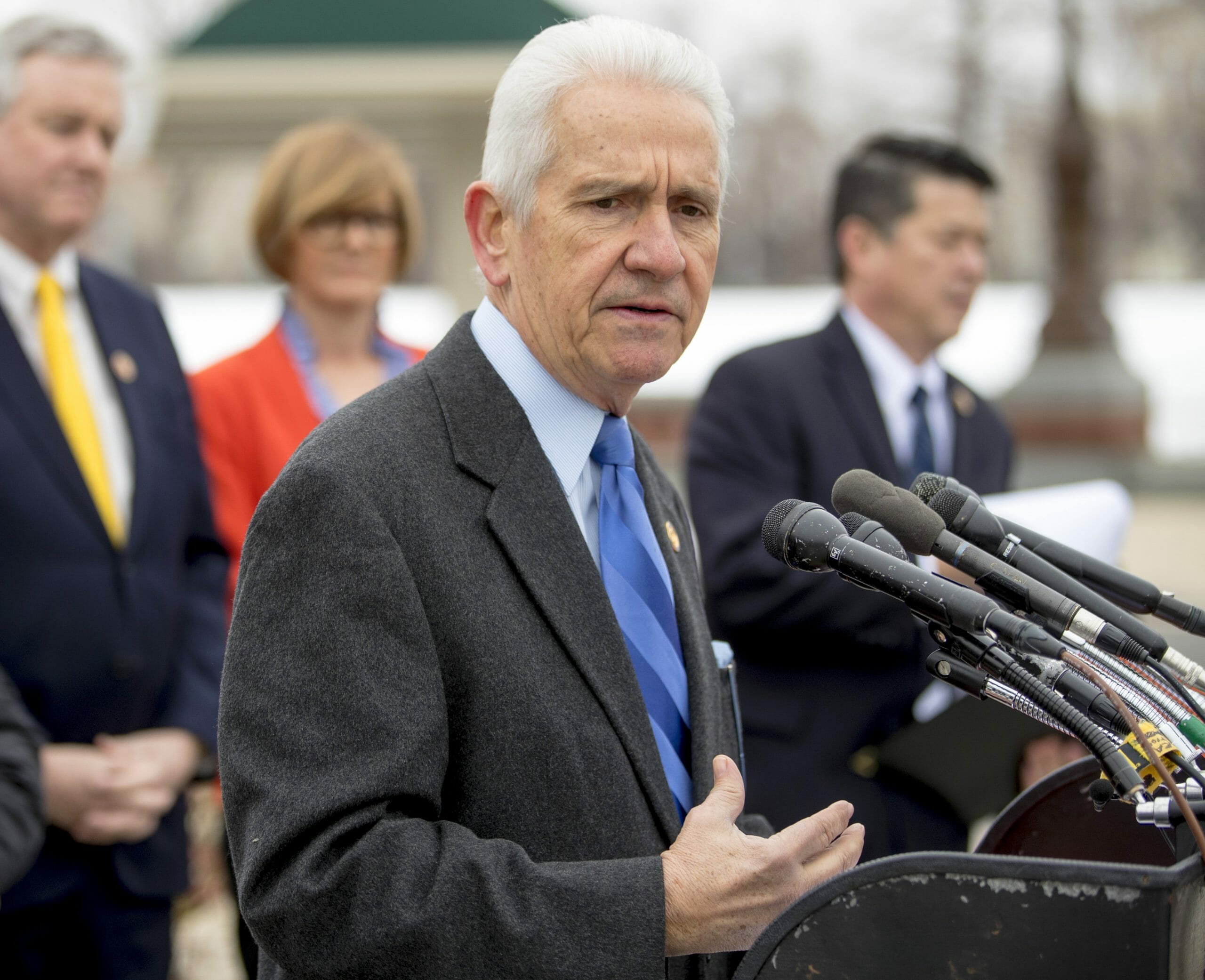
Dem House Challengers Looking To Push California Even Further Left
U.S. Rep. Jim Costa is something of an outlier in liberal-minded California — a centrist Democrat who supported the Keystone XL pipeline and was one of the last holdouts to line up behind President Barack Obama’s health care overhaul.
Costa has survived tough campaigns before, but the greatest threat to his future representing a district from California’s agriculture-rich Central Valley isn’t coming from a Republican this year. It’s coming from his own party.
The former chair of Congress’ more moderate Blue Dog Coalition is one of more than a dozen Democratic House incumbents in the state facing challenges from the party’s political left, underlining the long-running tension between the liberal wing and center-left establishment that is again shaping the Democratic presidential campaign.
How far to the political left will California go?
Early voting in California’s primary begins Monday and continues through election day on March 3.
Even House Speaker Nancy Pelosi, held up by conservatives as a paragon of liberal excess, is being challenged in her San Francisco district by Democrats pushing Medicare for all and other ideas championed by presidential candidates like U.S. Sens. Bernie Sanders and Elizabeth Warren.
Similarly, Rep. Jimmy Gomez, a liberal Democrat whose district is anchored in Los Angeles, is facing Democrat Frances Yasmeen Motiwalla, who calls him a progressive in name only who pockets campaign cash from banks and the defense industry.
The rivalry between the establishment and the far-left wing is shaking up districts nationally.
In Texas, long-serving Rep. Henry Cuellar is facing Jessica Cisneros, who is backed by Warren and Sanders. In Massachusetts, Rep. Richard Neal, who was first elected in 1988 and heads the powerful Ways and Means Committee, is being challenged by Holyoke Mayor Alex Morse, who is supported by Justice Democrats, the liberal political group that helped elevate New York City democratic socialist Alexandria Ocasio-Cortez to Congress in 2018.
The House races are being watched as a test of whether the surprise victory of Ocasio-Cortez was a fluke or a harbinger of broader political change within the Democratic Party.
California is the state President Donald Trump loves to hate, home of the so-called Trump resistance. Even so, droves of newer, younger voters, primarily Asians and Hispanics, tend to be more liberal than their parents or grandparents, and it’s possible the state already known as a Democratic fortress will continue to grow increasingly blue.
“The newer, more progressive people in the party are going to outlive the moderates,” said Michael Thaller, a former chair of the California Democratic Party’s Progressive Caucus.
“What we consider left now may be center in 10 years,” he added.
Some of the state races could eventually figure in the fight for control of the House, which Democrats reclaimed in 2018, in part by seizing seven GOP-held House seats in California.
However, many of the insurgent campaigns in California are likely to end up being largely symbolic — ousting an incumbent is a rarity in any state.
Costa, 67, appeared vulnerable after he was unable to win the state Democratic Party’s endorsement for the seat. But he’s stockpiled nearly $1 million for the contest, and his prominent supporters include Gov. Gavin Newsom and Sen. Kamala Harris, the former Democratic presidential contender.
He argues that he’s delivered in Congress, including routinely securing funds for farm programs in a district where agriculture is the backbone of the economy. His campaign declined a request to interview Costa but provided a written statement in which the congressman said he’s “focused on the issues that matter.”

His main Democratic challenger, Esmeralda Soria, 37, a lawyer and Fresno City Council member, sees it differently. She calls Costa, first elected in 2004, a captive of big-money politics and argues that “nothing has changed” in the farm-belt district that struggles with drinking water problems, poverty and homelessness.
Echoing Sanders and Warren, she says health care is a human right. And she’s rejecting corporate PAC funds that she blames for corrupting Congress.
“Washington is broken, corrupted by the greed of those at the top. It’s time for new leadership,” she says on her campaign website.
In an interview, Soria, the daughter of Mexican immigrant farm workers who is backed by labor icon Dolores Huerta and the liberal group Courage California, called Costa a friend but also ineffective and too close to corporate interests, particularly in farming.
“Just because you have a D after your name,” she said, referring to Costa’s Democratic affiliation, “that’s not enough.”
Her first challenge will be making it into the November election under California’s unusual “top two” primary rules, in which all candidates appear on the same ballot but only the top two vote-getters advance to the November general election, regardless of party affiliation.
Along with Costa and Soria, the March 3 primary ballot in the district includes Democrat Kimberly Elizabeth Williams and Republican Kevin Cookingham.
It’s possible Costa and Soria could end up in a head-to-head match-up for the seat in November.
Younger, more liberal voters are likely to lean her way but “can she convince enough of the longtime Costa supporters to abandon him?” asked Jeffrey Cummins, a professor of political science at California State University, Fresno. “You have to have a good reason to knock off the Democratic incumbent.”
The fight for Costa’s 16th District seat is one of the showcase contests in a state primary campaign rich in drama.
The liberal-centrist break is also playing out in the contest for the open 25th District in the Los Angeles suburbs, where former Rep. Katie Hill resigned last year amid an ethics probe, and San Diego County’s 53rd District, where 11 Democrats are on the ballot in the race to replace Rep. Susan Davis, who is retiring. Among them: San Diego City Council President Georgette Gomez, who is backed by Sanders and the Justice Democrats, the same group that helped send Ocasio-Cortez to Congress.
Meanwhile, former Republican Congressman Darrell Issa, who dogged President Barack Obama’s administration when he headed the House Oversight and Government Reform Committee, is trying to return to Washington in Southern California’s strongly Republican 50th District, a seat left vacant after former Rep. Duncan Hunter pleaded guilty to a corruption charge and resigned.
In Los Angeles, Gomez comes to his re-election race with established liberal credentials — he was endorsed by Sanders in 2018.
But rival Motiwalla, one of four Democrats on the ballot, got into the race after seeing his political committee had accepted money from banks, defense contractors and pharmaceutical companies.
With limited funding, she hopes grassroots organizing will help elevate her candidacy.
Among her policies, she supports a Green New Deal to combat the climate threat, and nuclear disarmament.
“One of the best ways to shine a spotlight on his activities, and pressure him, is to challenge him,” she said. “I realized I personally could not vote for him again.”
The Western Journal has reviewed this Associated Press story and may have altered it prior to publication to ensure that it meets our editorial standards.
Truth and Accuracy
We are committed to truth and accuracy in all of our journalism. Read our editorial standards.
Advertise with The Western Journal and reach millions of highly engaged readers, while supporting our work. Advertise Today.












